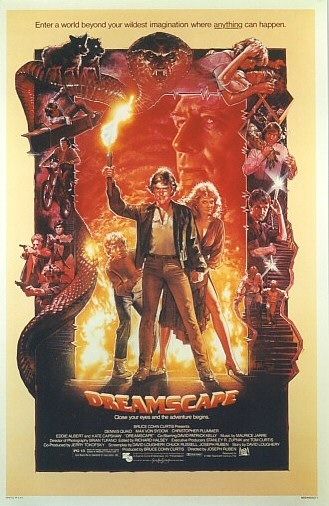
 Long
before people were interacting in a virtual reality slumber in films
like
The Cell
and
The Matrix, there was this
modestly overlooked sci-fi teaser which delved into the possibilities
of one person interacting with another in their dreams. It was a
fascinating idea, a bit before its time during its time of release in
1984, so new that the makers of this film seemed to think we wanted
action and romance rather than be bored by exploring the details of
the process itself. Perhaps that was true back then, in the
post-Raiders
of the Lost Ark and
E.T.
era, but you can't blame Dreamscape
for at least trying to inject some intelligence, simplistic though it
may be, into otherwise typical fare.
Long
before people were interacting in a virtual reality slumber in films
like
The Cell
and
The Matrix, there was this
modestly overlooked sci-fi teaser which delved into the possibilities
of one person interacting with another in their dreams. It was a
fascinating idea, a bit before its time during its time of release in
1984, so new that the makers of this film seemed to think we wanted
action and romance rather than be bored by exploring the details of
the process itself. Perhaps that was true back then, in the
post-Raiders
of the Lost Ark and
E.T.
era, but you can't blame Dreamscape
for at least trying to inject some intelligence, simplistic though it
may be, into otherwise typical fare.
Dennis Quaid (Jaws
3, Caveman) stars, playing a
psychically gifted man named Alex Gardner. He squanders most of
his gifts playing the horses and taking advantage of the ladies
through his charm, good looks, and ability to read minds, a fact that
doesn't go unnoticed by a Federal program which is looking for someone
just like him. It seems that the government has developed a
system where a person can project himself into the dreams of another,
guiding it, shaping it, until whatever anxiety or nightmares the
person is resolved. There is a bit of trouble, as a few of the
subjects have died, calling forth the notion that if you die in your
dreams, you die in life. Things get a bit dicier when the
president of the United States (Albert,
Escape to Witch Mountain) is brought in for his
nightmares about nuclear war, so terrifying that he wants to go to
Geneva to begin the process of disarmament, an idea that doesn't sit
well with everyone in the government, or in the Dreamscape program
itself.
Although the
main premise of dream-sharing is still quite fascinating to make it
entertaining today, one does have to overlook some rather dated
special effects and music in order to enjoy
Dreamscape
properly. This was, even in its day, a small budget sci-fi
fantasy with aspirations that probably exceeded the funds to make it
come true on the big screen. One can see the cost-cutting in the
dark look of the film, which would suggest cuts in lighting, and in
the synthesized, simplistic score. And of course, being the
Eighties, there was the cheesy, bright-colored fashion sense, which
makes even the hunky Dennis Quaid look a little more feminine than he
should.
The creative
brains behind Dreamscape
may have had more notions to craft a more horrific tale, but the
Spielberg-ian influences obviously ran too strong at the time, and the
end result is more scenes of humor than horror, and of getting it on
with Spielberg's babe, Kate Capshaw (Indiana
Jones and the Temple of Doom, Black Rain).
Still, there is enough disturbing imagery to frighten the squeamish,
and this is one of the first films to have the PG-13 rating on it for
good reason. However, like much of Spielberg's work, there is a
tendency to cross many genres, and play for as wide an audience as
possible, so the edginess is smoothed over, while injecting as much
romance and humor as one can during the proceedings.
The influence
of Dreamscape
is often overstated by cult fans, while
understated by the world at large. There's little doubt that Wes
Craven must have seen this film before creating his most popular film,
A
Nightmare on Elm Street, that
same year, which features similar themes and premises, and even some
resemblance in certain aspects of the villain.
The Cell
also builds its world of horror around an idea that is almost
identical the the Dreamscape project, and it too goes for much more
horror and gore in the dream sequences. And
The Matrix
recycled a few ideas, probably more
subconsciously, from the shared alternate realities, the "dying in the
alternate makes you die in reality," to the structure of the
Dreamscape machine (especially the seating,) the ever-present
"agents," and the notion of using martial arts to make it more cool.
Dreamscape
definitely merits a look for strong fans of
any of the previously mentioned films, or for lovers of good,
old-fashioned pulp sci-fi fantasy. It isn't a great film by any
stretch, but it does have great concepts, and while its on, it
definitely has enough to keep you in rapt attention for the duration.
It is, after all, playing everything for entertainment value.
While it will
likely be forever overshadowed by the films which took the main
premise to a much more serious level, for the ones in the know,
Dreamscape
will forever be the one that entered their fantasies and changed their
perceptions of what people can do in them.
Qwipster's rating:







©2003 Vince Leo

 Long
before people were interacting in a virtual reality slumber in films
like
Long
before people were interacting in a virtual reality slumber in films
like